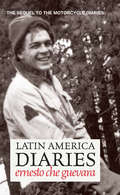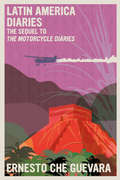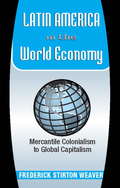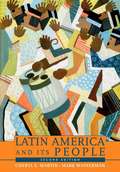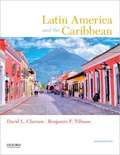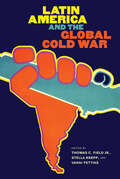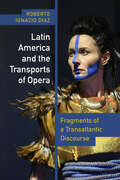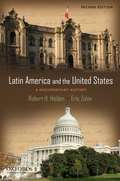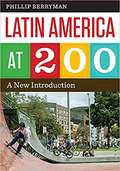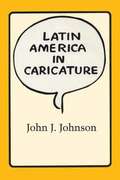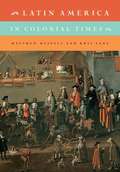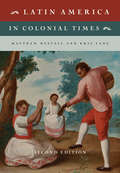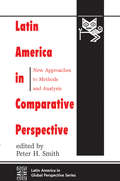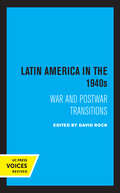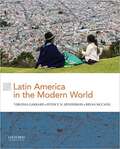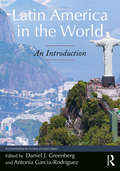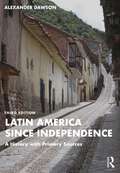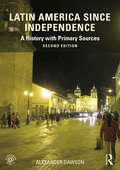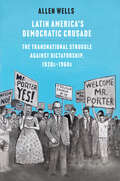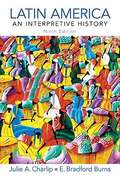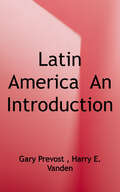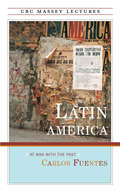- Table View
- List View
Latin America Diaries
by Ernesto Che Guevara"A wonderful glimpse into the maturing mind of a great man and a vital companion to the previous Che diaries."-Michael McCaughan, The Irish Times"Guevara . . . chronicles labor uprisings and resistance against the influences and interests of the US and its intelligence operations. Guevara's passions for history, archaeology, and science are also apparent in this absorbing glimpse of the development of a legendary revolutionary figure."-Vanessa Bush, Booklist"This second volume of travel diaries by revolutionary icon Guevara (after Motorcycle Diaries) shows the 25-year-old rebel wandering around South America in the latter half of 1953."-Publishers WeeklyThis sequel to The Motorcycle Diaries includes letters, poetry, and journalism that document Ernesto Che Guevara's second Latin American journey following his graduation from medical school. After traveling through Bolivia, Peru, Ecuador, and Central America, Ernesto witnesses the 1954 US-inspired coup in Guatemala. He flees to Mexico where he encounters Fidel Castro, marking the beginning of a political partnership that profoundly changes the world and Che himself.This new, expanded edition has been fully revised especially for Ocean Press by Che's widow Aleida March, meticulously correcting her own work of checking Che's handwriting. Includes thirty-two pages of unpublished photos, including photos taken by Che's son Ernesto as he retraces his father's footsteps. Features a prologue by Alberto Granado, Che's traveling companion in The Motorcycle Diaries.
Latin America Diaries: The Sequel to The Motorcycle Diaries (The Che Guevara Library)
by Ernesto Che GuevaraThe sequel to The Motorcycle Diaries, this book is Ernesto Che Guevera's journal documenting the young Argentine's second trip through Latin America, revealing the emergence of a committed revolutionary.These letters, poetry, and journalism document young Ernesto Guevara's second Latin American journey following his graduation from medical school in 1953. Together, these writings reveal how the young Argentine is transformed into a militant revolutionary.After traveling through Bolivia, Peru, Ecuador, and Central America, Ernesto witnesses the 1954 US-inspired coup in Guatemala, which has a profound effect on his political awareness. He flees to Mexico where he encounters Fidel Castro, marking the beginning of a political partnership that profoundly changes the world and Che himself. Includes a foreword by Alberto Granado, Che's companion on his first adventures in Latin America on a vintage Norton motorcycle, and features poems written by young Ernesto inspired by his experiences along with facsimiles of pages from his diary.
Latin America In The World Economy
by Frederick Stirton WeaverConsiders how external factors (the phases of world capitalism since Columbus) interweave with internal factors such as Latin American culture, politics, and social groups in Latin American development. With this text, Weaver (economics and history, Hampshire College) updates his article on capitalist development in South America originally published in Fall 1976. Over half of the text focuses on 1930 to the present. Annotation c. Book News, Inc. , Portland, OR (booknews. com)
Latin America In The World Economy
by Frederick Stirton WeaverLatin America in the World Economy considers the dual aspect of Latin American development: how external factors (phases of world capitalism since Columbus) interweave with internal factors (Latin American culture, politics, and social groups). Within his skillful approach, Weaver demonstrates how domestic social conflicts and power relations have consistently capitalized on changes in the international economy, while, conversely, engagement with the international economy has consistently constrained local struggles and patterns of change. With over half of the book dedicated to the "short" twentieth century (after 1930), Latin America in the World Economy is appropriate for courses in Latin American economic history, political economy, and development.
Latin America In The World Economy
by Frederick Stirton WeaverLatin America in the World Economy considers the dual aspect of Latin American development: how external factors (phases of world capitalism since Columbus) interweave with internal factors (Latin American culture, politics, and social groups). Within his skillful approach, Weaver demonstrates how domestic social conflicts and power relations have consistently capitalized on changes in the international economy, while, conversely, engagement with the international economy has consistently constrained local struggles and patterns of change. With over half of the book dedicated to the "short" twentieth century (after 1930), Latin America in the World Economy is appropriate for courses in Latin American economic history, political economy, and development.
Latin America and Its People
by Mark Wasserman Cheryl E. MartinOffering a balance of social, political, environmental, and cultural history, Latin America and Its People looks at the whole of Latin America in a thematic rather than country-by-country approach. This engaging textbook emphasizes the stories of the diverse people of Latin America, their everyday lives, and the issues that affected them. Written by two of the leading scholars in the field, Cheryl Martin and Mark Wasserman, Latin America and Its People presents a fresh interpretative survey of Latin American history from pre-Columbian times to the beginning of the twenty-first century. It examines the many institutions that Latin Americans have built and rebuilt - families, governments, churches, political parties, labor unions, schools, and armies - and it does so through the lives of the people who forged these institutions and later altered them to meet the changing circumstances. Emphasizes the story of the diverse people of Latin America, their everyday lives, and the issues and forces that affect them.
Latin America and the Caribbean
by David L. Clawson Benjamin F. TillmanRespected by scholars for its currency, clarity, authority, and rich visual and map program, Latin America and the Caribbean: Lands and Peoples elucidates the commonalities in this highly diverse, rapidly changing region, making it more comprehensive than ever for students and instructors. The sixth edition has been meticulously updated in order to take into account recent changes in the region and to more strongly emphasize environmental concerns.
Latin America and the Global Cold War (The New Cold War History)
by Thomas C. Field Jr., Stella Krepp, and Vanni PettinàLatin America and the Global Cold War analyzes more than a dozen of Latin America's forgotten encounters with Africa, Asia, and the Communist world, and by placing the region in meaningful dialogue with the wider Global South, this volume produces the first truly global history of contemporary Latin America. It uncovers a multitude of overlapping and sometimes conflicting iterations of Third Worldist movements in Latin America, and offers insights for better understanding the region's past, as well as its possible futures, challenging us to consider how the Global Cold War continues to inform Latin America's ongoing political struggles. Contributors: Miguel Serra Coelho, Thomas C. Field Jr., Sarah Foss, Michelle Getchell, Eric Gettig, Alan McPherson, Stella Krepp, Eline van Ommen, Eugenia Palieraki, Vanni Pettina, Tobias Rupprecht, David M. K. Sheinin, Christy Thornton, Miriam Elizabeth Villanueva, and Odd Arne Westad.
Latin America and the Transports of Opera: Fragments of a Transatlantic Discourse (Performing Latin American and Caribbean Identities)
by Roberto Ignacio DíazLatin America and the Transports of Opera studies a series of episodes in the historical and textual convergence of a hallowed art form and a part of the world often regarded as peripheral. Perhaps unexpectedly, the archives of opera generate new arguments about several issues at the heart of the established discussion about Latin America: the allure of European cultural models; the ambivalence of exoticism; the claims of nationalism and cosmopolitanism; and, ultimately, the place of the region in the global circulation of the arts. Opera&’s transports concern literal and imagined journeys as well as the emotions that its stories and sounds trigger as they travel back and forth between Europe—the United States, too—and Latin America. Focusing mostly on librettos and other literary forms, this book analyzes Calderón de la Barca&’s baroque play on the myth of Venus and Adonis, set to music by a Spanish composer at Lima&’s viceregal court; Alejo Carpentier&’s neobaroque novella on Vivaldi&’s opera about Moctezuma; the entanglements of opera with class, gender, and ethnicity throughout Cuban history; music dramas about enslaved persons by Carlos Gomes and Hans Werner Henze, staged in Rio de Janeiro and Copenhagen; the uses of Latin American poetry and magical realism in works by John Adams and Daniel Catán; and a novel by Manuel Mujica Lainez set in Buenos Aires&’s Teatro Colón, plus a chamber opera about Victoria Ocampo with a libretto by Beatriz Sarlo. Close readings of these texts underscore the import and meanings of opera in Latin American cultural history.
Latin America and the United States: A Documentary History
by Eric Zolov Robert H. HoldenLatin America and the United States: A Documentary History brings together the most important documents on the history of the relationship between the United States and Latin America from the nineteenth century to the present. In addition to standard diplomatic sources, the book includes documents touching on the transnational concerns that are increasingly taught in the classroom, including economic relations, environmental matters, immigration, human rights, and culture. The collection illuminates key issues while representing a variety of interests and views as they have both persisted and shifted over time, including often-overlooked Latin American perspectives and U. S. public opinion. Now fully revised in its second edition, Latin America and the United States: A Documentary History features updated selections on current trends, including key new documents on immigration, regional integration, indigenous political movements, democratization, and economic policy. The second edition adds twenty-one documents and revises ten existing texts to ensure maximum clarity. The first edition's careful consideration of the Latin American perspective on hemispheric relations has been strengthened in the second edition, with many selections translated from the original Spanish by the editors. Comprehensive introductions to each document provide the reader with essential information about its historical context and significance. The book's detailed index identifies and cross-references the themes, events, problems, personalities, and nations discussed in both the documents and their introductions. Ideal for undergraduate and graduate courses in Latin American history and U. S. -Latin America relations, this book also serves as a unique reference tool for foreign policy professionals, international law specialists, journalists, and scholars in a variety of disciplines.
Latin America at 200: A New Introduction (Joe R. And Teresa Lozano Long Series In Latin American And Latino Art And Culture)
by Phillip BerrymanBetween 2010 and 2025, most of the countries of Latin America will commemorate two centuries of independence, and Latin Americans have much to celebrate at this milestone. Most countries have enjoyed periods of sustained growth, while inequality is showing modest declines and the middle class is expanding. Dictatorships have been left behind, and all major political actors seem to have accepted the democratic process and the rule of law. Latin Americans have entered the digital world, routinely using the Internet and social media. <P><P>These new realities in Latin America call for a new introduction to its history and culture, which Latin America at 200 amply provides. Taking a reader-friendly approach that focuses on the big picture and uses concrete examples, Phillip Berryman highlights what Latin Americans are doing to overcome extreme poverty and underdevelopment. He starts with issues facing cities, then considers agriculture and farming, business, the environment, inequality and class, race and ethnicity, gender, and religion. His survey of Latin American history leads into current issues in economics, politics and governance, and globalization. Berryman also acknowledges the ongoing challenges facing Latin Americans, especially crime and corruption, and the efforts being made to combat them. Based on decades of experience, research, and travel, as well as recent studies from the World Bank and other agencies, Latin America at 200 will be essential both as a classroom text and as an introduction for general readers.
Latin America in Caricature
by John J. Johnson"Not many readers will thank the author as he deserves, for he has told us more about ourselves than we perhaps wish to know," predicted Latin America in Books of Latin America in Caricature-an exploration of more than one hundred years of hemispheric relations through political cartoons collected from leading U. S. periodicals from the 1860s through 1980. The cartoons are grouped according to recurring themes in diplomacy and complementing visual imagery. Each one is accompanied by a lengthy explanation of the incident portrayed, relating the drawing to public opinion of the day. Johnson's thoughtful introduction and the comments that precede the individual chapters provide essential background for understanding U. S. attitudes and policies toward Latin America.
Latin America in Colonial Times
by Matthew Restall Kris LaneFew milestones in human history are as dramatic and momentous as the meeting of three great civilizations on American soil in the sixteenth century. Latin America in Colonial Times presents that story in an engaging but scholarly new package, revealing how a new civilization - Latin America - emerged from that encounter. The authors give equal attention to the Spanish and Portuguese conquerors and settlers, to the African slaves they brought across the Atlantic, and to the indigenous peoples whose lands were invaded. From the dawn of empires in the fifteenth century, through the conquest age of the sixteenth, to the end of empire in the nineteenth, Latin America in Colonial Times combines broad brush strokes with the anecdotal details that bring the era to life.
Latin America in Colonial Times
by Matthew Restall Kris LaneFew milestones in human history are as dramatic and momentous as the meeting of three great civilizations on American soil in the sixteenth century. Latin America in Colonial Times presents that story in an engaging but scholarly new package, revealing how a new civilization - Latin America - emerged from that encounter. The authors give equal attention to the Spanish and Portuguese conquerors and settlers, to the African slaves they brought across the Atlantic, and to the indigenous peoples whose lands were invaded. From the dawn of empires in the fifteenth century, through the conquest age of the sixteenth, to the end of empire in the nineteenth, Latin America in Colonial Times combines broad brush strokes with the anecdotal details that bring the era to life.
Latin America in Colonial Times
by Matthew Restall Kris LaneFew milestones in human history are as momentous as the meeting of three great civilizations on American soil in the sixteenth century. The fully revised textbook Latin America in Colonial Times presents that story in an engaging but informative new package, revealing how a new civilization and region - Latin America - emerged from that encounter. The authors give equal attention to the Spanish and Portuguese conquerors and settlers, to the African slaves they brought across the Atlantic, and to the indigenous peoples whose lands were invaded. From the dawn of empires in the fifteenth century, through the conquest age of the sixteenth and to the end of empire in the nineteenth, the book combines broad brushstrokes with anecdotal details that bring the era to life. This new edition incorporates the newest scholarship on Spain, Portugal, and Atlantic Africa, in addition to Latin America itself, with indigenous and African views and women's experiences and contributions to colonial society highlighted throughout.
Latin America in Comparative Perspective: New Approaches to Methods and Analysis (Latin America in Global Perspective)
by Peter H Smith<p>This book, the inaugural publication in a multivolume series entitled Latin America in Global Perspective, highlights the necessity and feasibility of analyzing Latin American society and politics within broad comparative frameworks. <p>The rapidly changing agenda for social science research on the region calls for the rigorous application of new concepts and methodologies, especially in light of the apparent exhaustion of the “dependency” paradigm. The examination of broad themes, such as development strategies and processes of democratization, can be facilitated through systematic comparisons with other world regions, and the study of specific issues—such as electoral behavior or social inequality—requires the judicious use of quantitative measurement. The question, therefore, is not only what to investigate but also how. <p>This volume brings together original research by distinguished scholars from a variety of countries. Analytical chapters explore methodological strategies for cross-regional comparison, intraregional comparison, and the application of rational choice; topical chapters offer new approaches to the study of women, state power, corporatism, and political culture. A concluding section examines the political significance of public opinion research in Mexico, Peru, and the former Soviet Union.</p>
Latin America in the 1940s: War and Postwar Transitions
by David RockThis title is part of UC Press's Voices Revived program, which commemorates University of California Press’s mission to seek out and cultivate the brightest minds and give them voice, reach, and impact. Drawing on a backlist dating to 1893, Voices Revived makes high-quality, peer-reviewed scholarship accessible once again using print-on-demand technology. This title was originally published in 1994.
Latin America in the Modern World
by Peter V. N. Henderson Bryan McCann Virginia GarrardLatin America in the Modern World is the first text to situate the history of Latin America within a wider global narrative. Written by leading scholars, the book focuses on five themes: state formation; the construction of national identity through popular culture and religion; economics and commodities; race, class, and gender; and the environment. Emphasizing the distinct experiences of each of the Latin American countries, the book provides students with an entry point into understanding this vital region. Instead of suggesting that all Latin American nations have an interchangeable heritage, the authors seek to clearly identify themes, topics, people, and intellectual currents that help to knit the history of modern Latin America into a coherent category of study. While providing in-depth coverage of the history of the three largest Latin American countries (Mexico, Brazil, and Argentina), Latin America in the Modern World also offers case studies from almost all of the countries, including Central American and Andean nations.
Latin America in the World: An Introduction (Foundations in Global Studies)
by Antonia Garcia-Rodriguez Daniel J. GreenbergFrom the Foundations in Global Studies series, this text offers students a fresh, comprehensive, multidisciplinary entry point to Latin America. After a brief introduction to the study of the region, the early chapters of the book survey the essentials of Latin American history; important historical narratives; and the region’s languages, religions, and global connections. Students are guided through the material with relevant maps, resource boxes, and text boxes that support and guide further independent exploration of the topics at hand. The second half of the book features interdisciplinary case studies, each of which focuses on a specific country or subregion and a particular issue. Each chapter gives a flavor for the cultural distinctiveness of the particular country yet also draws attention to global linkages. Readers will come away from this book with an understanding of the larger historical, political, and cultural frameworks that shaped Latin America as we know it today, and of current issues that have relevance in Latin America and beyond.
Latin America since Independence: A History with Primary Sources
by Alexander DawsonNow in its third edition, Latin America since Independence explores the region’s rich and diverse history through carefully selected stories, primary source documents, maps, and tables that offer a diverse approach to dominant historical narratives. While histories of the "other" Americas often link disparate histories through revolutionary or tragic narratives, this text begins with the assumption that our efforts to imagine a common past for nearly thirty countries are deeply problematic. Without losing sight of chronology or regional trends, the book offers a distinctive conceptualization of the region as a diverse social landscape with a multiplicity of peoples and voices. Each chapter introduces students to a specific historical issue, which in turn raises questions about the history of the Americas as a whole. Key themes include: Race and Citizenship Inequality and Economic Development Politics and Rights Foreign Interventions Social and Cultural Movements Globalization Violence and Civil Society The Environment Chapters also include timelines highlighting important dates and suggestions for further reading. This third edition has been updated throughout and includes a new Chapter 9 that discusses foreign intervention in Central America, and new text on the drug wars, resource extraction, and indigenous self-determination. Richly informative and highly readable, Latin America since Independence provides compelling accounts of this region’s past and present that will be of interest to students of Latin American history and society.
Latin America since Independence: A History with Primary Sources
by Alexander DawsonWhat is Latin America, after all? While histories of the "other" Americas often link disparate histories through revolutionary or tragic narratives, Latin America since Independence begins with the assumption that our efforts to imagine a common past for nearly thirty countries are deeply problematic. Without losing sight of chronology or regional trends, this text offers glimpses of the Latin American past through carefully selected stories. Each chapter introduces students to a specific historical issue, which in turn raises questions about the history of the Americas as a whole. Key themes include: Race and Citizenship Inequality and Economic Development Politics and Rights Social and Cultural Movements Globalization Violence and Civil Society The short, thematic chapters are bolstered by the inclusion of relevant primary documents - many translated for the first time - including advertisements and posters, song lyrics, political speeches, government documents, and more. Each chapter also includes timelines highlighting important dates and suggestions for further reading. Richly informative and highly readable, Latin America since Independence provides compelling accounts of this region's past and present. This second edition brings the story up to the present, with revised chapters, new primary documents and images, and a new 'At A Glance' feature that uses a selection of maps and tables to illuminate key issues like the economy, the environment, and demographics. For additional information and classroom resources please visit the Latin America since Independence companion website at www.routledge.com/cw/dawson.
Latin America's Democratic Crusade: The Transnational Struggle against Dictatorship, 1920s-1960s
by Allen WellsBy emphasizing Latin American reformers’ decades-long struggle to defeat authoritarianism, this transnational history challenges the timeworn Cold War paradigm and recasts the region’s political evolution Scholars persist in framing the Cold War as a battle between left and right, one in which the Global South is cast as either witting or unwitting proxies of Washington and Moscow. What if the era is told from the perspective of the many who preferred reform to revolution? Scholars have routinely neglected, dismissed, or caricatured moderate politicians. In this book, Allen Wells argues that until the Cuban Revolution, the struggle was not between capitalism and communism—that was Washington’s abiding preoccupation—but between democracy and dictatorship. Beginning in the 1920s, the fight against authoritarianism was contested on multiple fronts—political, ideological, and cultural—taking on the dimensions of a political crusade. Convinced that despots represented an existential threat, reformers declared that no civilian government was safe until the cancer of dictatorship was excised from the hemisphere. Dictators retaliated, often with deadly results, exporting strategies that had been honed at home to guarantee their political survival. Grafted onto this war without borders was a belated Cold War, with all its political convulsions, the aftershocks of which are still felt today.
Latin America: An Interpretive History (Ninth Edition)
by Julie A. Charlip E. Bradford BurnsFor courses in the History of Latin America and Modern Latin America. Organized thematically, this text offers a clear narrative that weaves the story of Latin America together with coverage of broader themes and regional differences. In addition to the great diversity within Latin America, there is also a common theme that encompasses the sweep of history in the region. The original author of the text, E. Bradford Burns, cast the problem as the paradox that poor people inhabit rich lands. The reason for this paradox is that a tiny group of elites confuses their nation's well-being with their own. When this text was first published in 1972, there were very few texts on Latin America, and the ones that existed largely read like catalogs of historical events. Although there are others now, this textbook is still a leader in the field because of its clear thematic organization and a central narrative that tells a cohesive story, albeit with many variations. Co-author Julie A. Charlip is committed to continuing the Burns legacy. Despite changes in research, interpretations, and theories, Burns's basic premise is still the most accurate and succinct, providing the best framework for approaching the region.
Latin America: An Introduction
by Harry E. Vanden Gary PrevostThis book offers a contemporary, thematic analysis of the region that is grounded in Latin America's social, political, economic, and cultural past. <p><p>Based on chapters from Harry Vanden and Gary Prevost's popular text, Politics of Latin America, this book provides an accessible and interesting discussion of a broad range of topics, including democracy, revolution, indigenous populations, culture, gender, religion, politics, economy, and relations with the United States. Unlike many texts on the region, this book places the voices of long-ignored and previously marginalized groups in Latin America--women, indigenous peoples, Afro-Latinos, workers, peasants, and gays and lesbians--at the heart of its analysis. Offering balanced regional coverage, the book discusses such recent political, social, and economic developments as the failure of the neoliberal economic policies of the 1980s and 1990s to deliver promised prosperity; the related resurgence of progressive politics in the region, as manifested in the election of numerous left and center-left governments; and the strong role of numerous social movements in setting the region's political agenda in the new century. <p><p>The authors analyze the continuing power of the United States in the region, as seen in the implementation of the Central America Free Trade Agreement (CAFTA), bilateral trade agreements with Chile and Peru, and the continued funding of Plan Colombia. They also discuss the role of various Latin American-based initiatives, including the expansion of MERCOSUR, the Bolivarian Alternative, and The Bank of the South. Providing a historical perspective for the challenges and problems facing the region today, Latin America: An Introduction's regionally balanced, multidisciplinary approach makes it an ideal text for introduction to Latin American studies courses.
Latin America: At War with the Past (The CBC Massey Lectures)
by Carlos FuentesA passionate argument for the geopolitical autonomy of Latin America, Carlos Fuentes's 1984 CBC Massey lectures trace the region's unique historical and cultural tensions and call upon foreign powers to cease interference in a sphere of influence they rarely fully understand. Fuentes sees the turbulence in Latin America ending not with political solutions, but economic ones. Foreshadowing the end of the Cold War, the signing and expansion of NAFTA, and the Mexican peso crisis of 1994, Fuentes urges further co-development in a progressively interdependent world and the creation of a new global economic and financial system. The new world economic order is not an exercise in philanthropy, he contends, but in enlightened self-interest for everyone concerned. Forthright and intelligently reasoned, Carlos Fuentes's Latin America is a timeless book about the challenges facing emergent democracies and the opportunities for growth that exist within the countries themselves.
